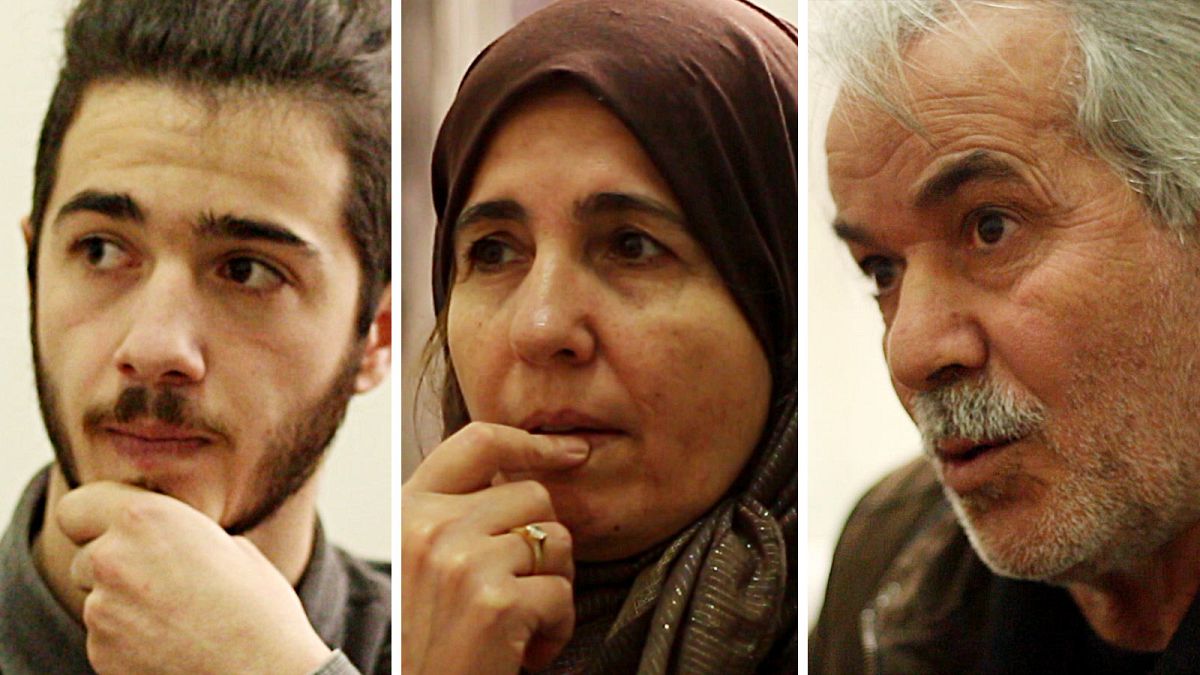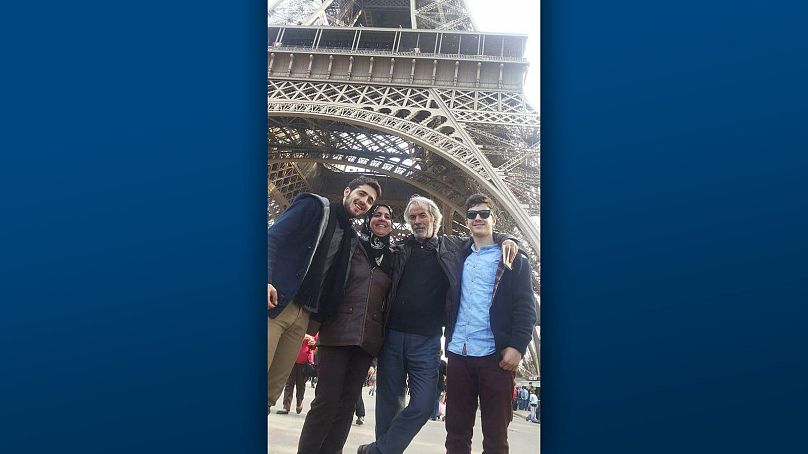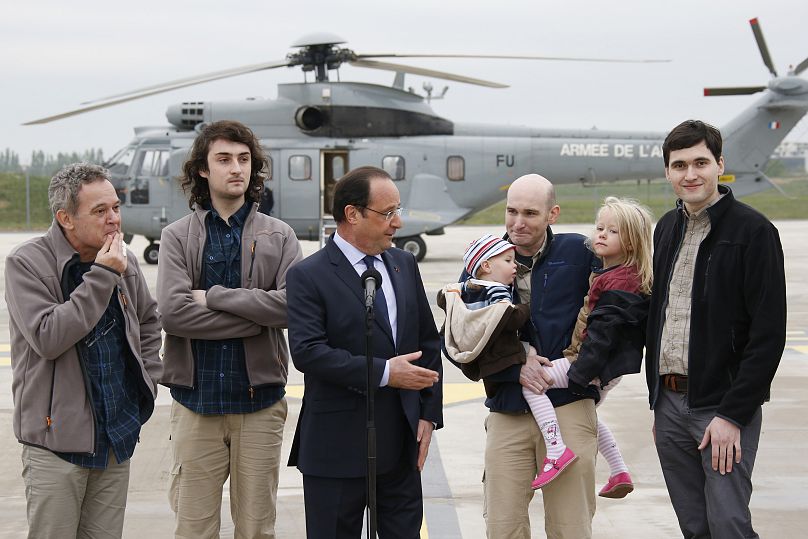In spring 2013, Syria’s government lost the city of Raqqa to rebel militants. Raqqa was also home to the Khatib family, who offered shelter to international journalists at their house as the conflict escalated. But one day, two of them disappeared, and the Khatibs realised their time was nearly up.
In spring 2013, Syria’s government lost the city of Raqqa to rebel militants. It would later become the de facto capital of the so-called Islamic State (ISIL), a jihadist terror group. Raqqa was also home to the Khatib family, who offered shelter to international journalists at their house as the conflict escalated. But one day, two of them disappeared, and the Khatibs realised their time was nearly up.
It’s October 2013. Abed Alhamid Khatib is sitting down for two interviews with French journalists Nicolas Henin, a writer for Le Point magazine, and Pierre Torres, a reporter with French-German television channel Arte. An opponent of President Bashir Al-Assad, 56-year-old Hamid is a respected and well-connected anti-government activist in Raqqa and has been working to establish a local council for its residents. Rebel groups have infiltrated the city and, in an effort to gain power, are more interested in fighting each other than taking care of the community.
Journalists are regular guests in the Khatib household, and Henin and Torres have been living there for weeks while covering the conflict on the ground. But one day, Hamid becomes anxious. It is late, and he has been waiting for the reporters to return for hours.
“[They] had left the house and did not return by 12am, so I waited until 6am the next morning,” says Hamid, now 61 and living in Lyon. “But they didn’t come back, and I realised they had been kidnapped again.”
The jihadist al-Nusra Front are the most dominant rebel group in Raqqa. They had already taken Henin and Torres hostage two weeks earlier, robbed them of their money and passports, and released them. This time, however, they did not feel so generous.
But journalists were not their only targets.
“We took the decision to leave after I saw the kidnapping of my friends and neighbours,” says Hamid, who lived in Syria with his wife Hala, then 49, and two of his four children: Mowaea, 21, and Ziad, 14.
It was around this time that Nusra would cede control of Raqqa, and their detainees, to ISIL. The terror group learned of Hamid’s activism and spied on his house. Militants stormed the homes of his fellow activists and arrested them. Many were murdered, while the fate of others remains unknown.
Then came the threats to kill Hamid.
“We felt that we were going to being next, so we decided to flee to Turkey,” he says.
The escape
Hala, at least, was safe, having flown to Dubai months earlier to stay with relatives due to ill health, while Mowaea was in Turkey training with an NGO. leaving Hamid to plot an escape with Ziad.
Recalling his last day in Syria, Hamid says: “You cannot comprehend the pain of leaving your home and your country behind. When you leave everything to go to a country where you do not speak its language or know anyone there.
“I stood in front of the door of my house. We had a big house, full of pictures and stuff.
“I am a poet and I had my poems and paintings, and so I asked myself: What can I take with me from this house?
“I decided to take only my passport and nothing else…except maybe some trousers and a shirt.”
Hamid and Ziad took their few belongings and spent the night at a friend’s house before paying a driver to take them to the Turkish border at dawn.
“The roads were blocked by ISIS so we fled to Turkey illegally,” says Hamid.
The pair managed to cross the border gates without visas and pass through the city of Urfa, before joining Mowaea 65km north of the border after a four-day trek.
Within months, Hala had returned from Dubai and the family found a permanent home in the city of Gaziantep. Ziad was homeschooled, while Mowaea secured work as a project officer with a US organisation and used his salary to support the household.
Back in Raqqa, the Khatib’s house was a pile of rubble. Within days of it being abandoned, jihadist fighters moved in and erected a wall around it, attracting the attention of military jets. The family suspects bombs were being made there, but will never know for sure.
Returning the favour
The Khatibs had been living in Turkey for six months when they received an unexpected phone call.
“I left Syria in October and they were arrested in June,” says Hamid, referring to Henin and Torre’s capture by jihadists.
“The journalists had a Facebook page and we learned that there had been a deal.”
In April 2014, the French government had secured the release of four journalists and ISIL hostages: Didier Francois, Edouard Elias — and Henin and Torre, who had been chained together in an underground cell for half a year.
“They called us,” Hamid continues, “Nicolas and Pierre.
“They said they were in a hotel in Turkey.”
The Khatibs were delighted. Hamid and his two sons arranged to meet the pair in Gaziantep. It was an emotional reunion.
“Everyone from the [French] embassy was there, and some of them cried when they saw us meet.
“And then they made an asylum application for me that I didn’t know about – I did not apply.”
A new life
Following months of interviews, background checks and paperwork, the Khatibs were finally granted passage to France and settled in Lyon in 2015. They have since made it their home – along with the rest of the family.
Hala and Hamid took up French. Ziad, now 18 and sporting a topknot, has almost finished his Baccalaureate in English, French and Arabic literature. Mowaea, 27, lives in Paris, where he is studying Persian at university. And the eldest children, Marwan, 35, and Layal, 32, uprooted their lives in Dubai and Oman respectively to join the family in France.
Together, they are on the hunt for a van for their up-and-coming mobile food business ‘Pita Et Baguette’, where they plan to serve hot, delicious Syrian food at public events.
The Khatibs have a future and are thriving. But what about Syria? Once the conflict is over and the country is rebuilt, would they go back?
“It was difficult and new for us. We had never left the city before,” says Ziad, recalling Raqqa. “Even when we did leave, it was only for a week or two.
“Then when we came to Turkey, I always thought we would go back to Raqqa, and I will never lose this feeling for the rest of my life.”
*Some names have been changed to protect the identity of the source.


